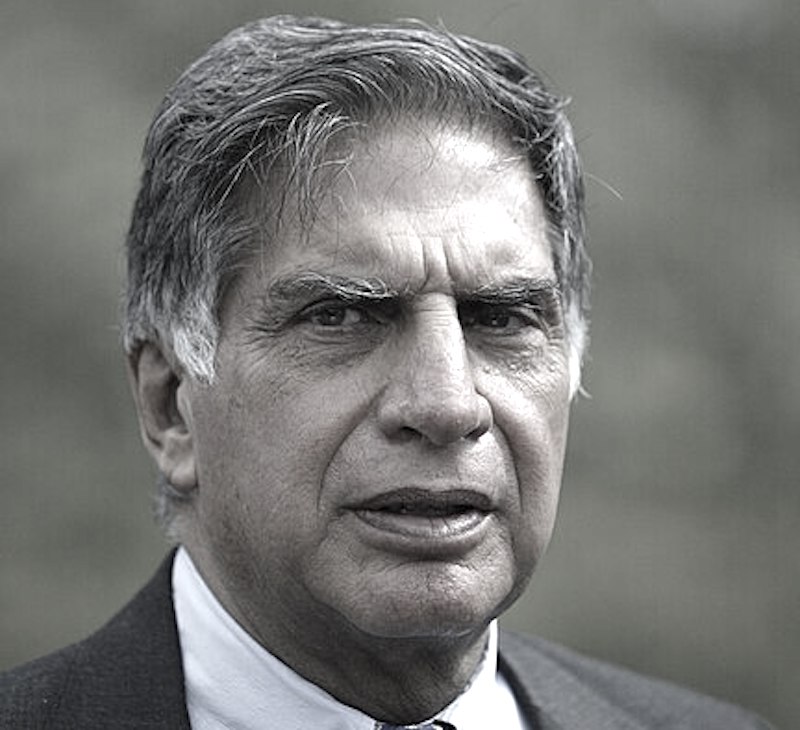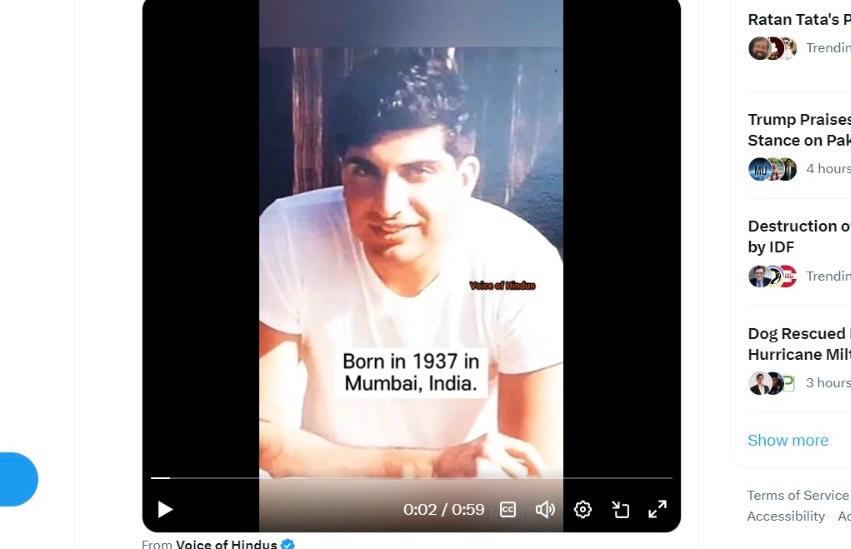 Ratan Tata (1937-2024)
Ratan Tata (1937-2024)
Ratan Tata, India's most revered industrialist and former Tata Group chairman, dies at 86
Mumbai/IBNS: Legendary industrialist Ratan Tata, who was the chairman emeritus of Tata Sons, died in Mumbai on Wednesday, the Tata Group said in a statement. He was 86.
The former chairman of Tata Group and a national icon for his august bearing and examplary business ethics was undergoing treatment at Mumbai's Breach Candy Hospital after his admission there during the day. Following his admission his condition worsened and turned critical.
"It is with a profound sense of loss that we bid farewell to Mr. Ratan Naval Tata, a truly uncommon leader whose immeasurable contributions have shaped not only the Tata Group but also the very fabric of our nation," said N Chandrasekaran, Chairman, Tata Sons, in a late-night statement.
"For the Tata Group, Mr. Tata was more than a chairperson. To me, he was a mentor, guide and friend. He inspired by example. With an unwavering commitment to excellence, integrity, and innovation, the Tata Group under his stewardship expanded its global footprint while always remaining true to its moral compass," Chandrasekaran said.
In an X post, Prime Minister Narendra Modi mourned his death saying "Shri Ratan Tata Ji was a visionary business leader, a compassionate soul and an extraordinary human being." He provided stable leadership to one of India’s oldest and most prestigious business houses, the PM wrote.
Shri Ratan Tata Ji was a visionary business leader, a compassionate soul and an extraordinary human being. He provided stable leadership to one of India’s oldest and most prestigious business houses. At the same time, his contribution went far beyond the boardroom. He endeared… pic.twitter.com/p5NPcpBbBD
— Narendra Modi (@narendramodi) October 9, 2024
In a social media post earlier in the day, Tata, who was the chairman of the group for 20 years, assured that he remained in good spirits and emphasised that there was no cause for alarm.
In 2008, he received the Padma Vibhushan, the second highest civilian honour in India, after receiving the Padma Bhushan, the third highest civilian honour in 2000.
Ratan Tata took over as chairman of the autos-to-steel conglomerate in 1991, leading the company, established by his great-grandfather over a century ago, until 2012.
He also founded Tata Teleservices in 1996 and oversaw the public listing of Tata Consultancy Services in 2004.
Ratan Tata carried forward the Tata legacy of highest corporate social responsibility through countless philanthropic works, including setting up of centres of academic excellence, research institutes and hospitals.
After his retirement, he was honored with the title of chairman emeritus for Tata Sons, Tata Industries, Tata Motors, Tata Steel, and Tata Chemicals, according to the company's website.
India mourns Ratan Tata's demise:
Leader of Opposition Rahul Gandhi in an X post said: "Ratan Tata was a man with a vision. He has left a lasting mark on both business and philanthropy. My condolences to his family and the Tata community."
Ratan Tata was a man with a vision. He has left a lasting mark on both business and philanthropy.
— Rahul Gandhi (@RahulGandhi) October 9, 2024
My condolences to his family and the Tata community.
Businessman Harsh Goenka posted: "The clock has stopped ticking. The Titan passes away. #RatanTata was a beacon of integrity, ethical leadership and philanthropy, who has imprinted an indelible mark on the world of business and beyond. He will forever soar high in our memories. R.I.P"
The clock has stopped ticking. The Titan passes away. #RatanTata was a beacon of integrity, ethical leadership and philanthropy, who has imprinted an indelible mark on the world of business and beyond. He will forever soar high in our memories. R.I.P pic.twitter.com/foYsathgmt
— Harsh Goenka (@hvgoenka) October 9, 2024
Lamenting Tata's demise, industrialist Ananda Mahindra said: "I am unable to accept the absence of Ratan Tata. India’s economy stands on the cusp of a historic leap forward. And Ratan’s life and work have had much to do with our being in this position. Hence, his mentorship and guidance at this point in time would have been invaluable.
"With him gone, all we can do is to commit to emulating his example. Because he was a businessman for whom financial wealth and success was most useful when it was put to the service of the global community," he wrote.
I am unable to accept the absence of Ratan Tata.
— anand mahindra (@anandmahindra) October 9, 2024
India’s economy stands on the cusp of a historic leap forward.
And Ratan’s life and work have had much to do with our being in this position.
Hence, his mentorship and guidance at this point in time would have been invaluable.… pic.twitter.com/ujJC2ehTTs
Gautam Adani posted: "India has lost a giant, a visionary who redefined modern India's path. Ratan Tata wasn’t just a business leader - he embodied the spirit of India with integrity, compassion and an unwavering commitment to the greater good. Legends like him never fade away. Om Shanti."
India has lost a giant, a visionary who redefined modern India's path. Ratan Tata wasn’t just a business leader - he embodied the spirit of India with integrity, compassion and an unwavering commitment to the greater good. Legends like him never fade away. Om Shanti 🙏 pic.twitter.com/mANuvwX8wV
— Gautam Adani (@gautam_adani) October 9, 2024
Life Sketch
Born in Mumbai (then Bombay) into a Parsi Zoroastrian family, on Dec 28, 1937 Ratan Tata's father was Naval Tata, who was born in Surat and later adopted into the Tata family, and his mother was Sooni Tata, the niece of Tata group founder Jamsetji Tata.
Tata's biological grandfather, Hormusji Tata, was a member of the Tata family by blood. In 1948, when Tata was 10, his parents separated, and he was subsequently raised and adopted by Navajbai Tata, his grandmother and widow of Ratanji Tata. His younger brother was Jimmy Tata while he had a half-brother, Noel Tata, from Naval Tata's second marriage with Simone Tata, with whom he was raised.
He went to the Campion School and the Cathedral and John Connon School in Mumbai, besides the Bishop Cotton School in Shimla, and the Riverdale Country School in New York City. After graduating from high school, Tata enrolled in Cornell University in the US, from which he obtained a bachelor's degree in architecture in 1959.

Why he was never married
Ratan Tata never married and had no children. In 2011, Ratan Tata stated, "I came close to getting married four times and each time I backed off in fear or for one reason or another."
According to one news report, while he was in Los Angeles after graduation he had fallen in love and almost got married but had to return to India for his indisposed grandmother.
However, his girlfriend could not follow him to India. “But because of the 1962 Indo-China war, her parents weren’t okay with her making the move anymore, and the relationship fell apart,” he told Humans of Bombay.
Support Our Journalism
We cannot do without you.. your contribution supports unbiased journalism
IBNS is not driven by any ism- not wokeism, not racism, not skewed secularism, not hyper right-wing or left liberal ideals, nor by any hardline religious beliefs or hyper nationalism. We want to serve you good old objective news, as they are. We do not judge or preach. We let people decide for themselves. We only try to present factual and well-sourced news.







